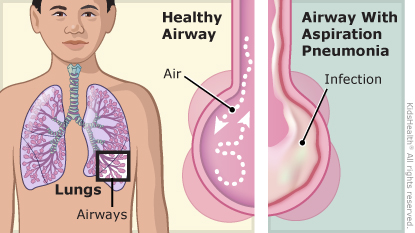Aspiration pneumonia is a lung infection. It happens when something gets into the lungs that doesn't belong there. Kids with aspiration pneumonia may have a fever, cough, chest pain, and trouble breathing.
Doctors treat aspiration pneumonia with antibiotics. Most kids start to feel better in a day or two after starting antibiotics, but the cough can continue for several weeks.



Your child:

Your child seems very sick, is struggling to breathe, or is not responding to you.

What causes aspiration pneumonia? The body normally keeps saliva (spit), mucus, food, liquid, vomit (throw up), and stomach acid out of the lungs. If any of these get into the lungs, they can cause an infection called aspiration pneumonia.
Who gets aspiration pneumonia? Aspiration pneumonia is more common in kids who have trouble swallowing or who aren't always able to cough to clear things out of their lungs. This includes kids who have feeding tubes; who are on breathing machines; or who have seizures, lung disease, or gastroesophageal reflux (when stomach acid goes up into the esophagus, or throat).